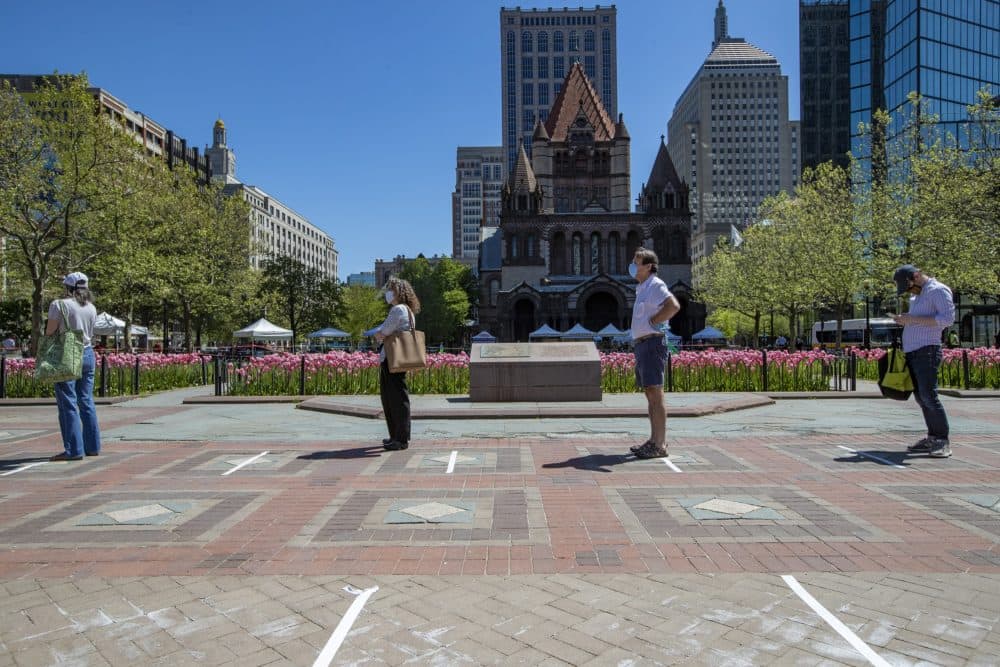Advertisement
Coronavrius Coverage
Is Mass. Ready For Phase 2 Reopening? Experts Say It May Be Too Soon To Tell

Massachusetts is poised to enter the second phase of its reopening plan, possibly as early June 8. Businesses await word Saturday from Gov. Charlie Baker, who has promised to set the date for hotels to resume bookings, restaurants to welcome dining in and shoppers to go back to retail stores, among other easing of restrictions.
So far, it appears that phase one has gone well. The positive test rate for new coronavirus cases and other indicators of recovery continue to trend down. But health experts caution that it may still be too soon to know if the state is ready to lift more restrictions safely.
That’s because it takes time for COVID-19 symptoms to show up. So, if more people are getting sick now because of loosened restrictions during phase one of the plan, they won’t know or get tested for the coronavirus for several days.
Jagpreet Chhatwal, a data scientist at Harvard Medical School, says that creates a roughly two-week lag time between the state’s COVID-19 data and the reality of coronavirus transmission in the community.
“We will not have seen any [warning] signs in the last 10 days. It’s only from this point onward that we will see some signs,” Chhatwal says. “We may be better off waiting at least a week or 10 days before really finding out if we could expect a spike in cases or not.”
If the coronavirus has spread rapidly in the last two weeks, Chhatwal says scaling back to phase one or a stay-at-home advisory might be logistically challenging. But, he says delaying the start of phase two is simple.
Since the start of phase one, some businesses like barber shops and hair salons have opened again, and churches have resumed in-person services — all with limited capacity. Health experts say it’s possible that some transmission of the virus has risen already.
Add to that the large crowds that have gathered during a wave of protests sparked by the killing of George Floyd, and there is the possibility that more people have been exposed to the coronavirus.
Advertisement
“When the virus is given more opportunities to transmit, we can be pretty confident that it’s going to take them,” says William Hanage, an epidemiologist at the Harvard T.H. Chan School of Public Health.
Because looking at case numbers reported by the state gives a picture that is, at best, several days old, Barry Bloom, a public health researcher also at the Harvard T.H. Chan School of Public Health, says that states need to have a strong system in place for contact tracing – or investigating new cases of COVID-19 and tracking down people who may have been exposed.
“You want to put an enormous amount of effort into contact tracing to be able to isolate people [who have been exposed to the coronavirus],” Bloom says. “It’s the isolation of those people that blocks the chain of transmission.”
Massachusetts has launched an ambitious contact tracing program, but the state was already one of the hardest hit by the coronavirus. More than 102,000 residents have experienced confirmed or probable infections, according to state data, and 7,201 people have died.
States also need to be able to perform coronavirus tests for anyone who wants one and have sufficient hospital beds and medical equipment to handle a second surge, if it comes to that, says Dr. Shira Doron, an epidemiologist at Tufts University.
And so far, she says, Massachusetts has done well with those preparations. Testing has become more widely available, Doron says, and most hospitals in the state are no longer operating additional intensive care space. Field hospitals like those in the DCU Center in Worcester and the Boston Convention and Exhibition Center have ceased operations or stopped taking new patients.
“In terms of contact tracing, Massachusetts is a leader,” she says. “Our state has hired a large number of contact tracing that is predicted to be sufficient even if cases rise and contacts per case rise.”
Health professionals are also more experienced for a second spike in cases if one happens, Doron adds. She says that adds to the state’s preparedness to move into the next phase of reopening.
“We have many things in place that we didn’t have pre-lockdown including knowing how to surge, having the protocols and training in place to handle another surge or even the confidence. We just did it; we know we can do it again,” she says.
But more than anything else, Doron says if the state is going to successfully move into phase two of the reopening plan, people will need to continue adhering to safety guidelines. That includes keeping six feet of distance from others, avoiding large gatherings and wearing a mask.
“It really depends on each individual,” she says. “Knowing that we’re not going back in time to a place where we were pre-pandemic."
This segment aired on June 5, 2020.
